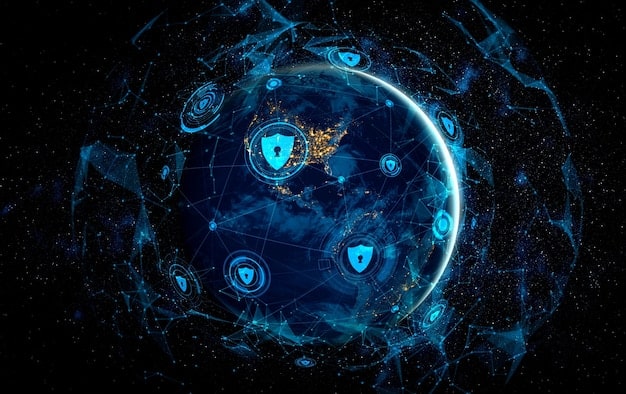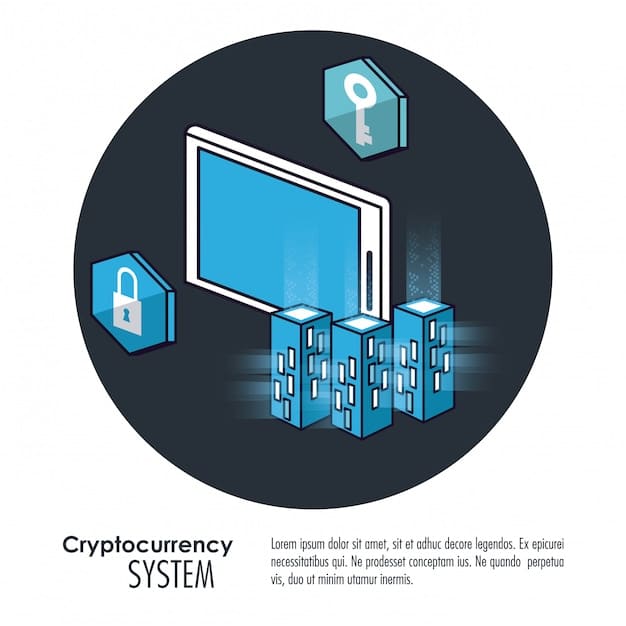Unveiling the Best VPNs of 2025: Speed & Security Review

Unveiling the Best VPNs of 2025: A Speed and Security Review identifies top contenders based on rigorous testing, focusing on speed, security protocols, server network, and user experience to ensure optimal online security and performance for users in the US.
Ready to discover the most secure and fastest VPNs of 2025? Unveiling the Best VPNs of 2025: A Speed and Security Review dives deep into the top contenders, ensuring your online experience is both protected and lightning-fast.
Understanding VPNs and Their Importance in 2025
In an increasingly digital world, VPNs have become essential tools for online privacy and security. As we approach 2025, the threats to our data are more sophisticated than ever, making a reliable VPN a necessity.
Why You Need a VPN in 2025
The digital landscape is evolving rapidly, and with it, the need for robust online protection. VPNs provide a secure tunnel for your internet traffic, shielding you from prying eyes and potential cyber threats.
Key Features to Look for in a VPN
When choosing a VPN, consider factors like encryption strength, server locations, speed, and privacy policies. A VPN with strong encryption and a no-logs policy ensures your data remains private and secure.
- Encryption Standards: Look for AES-256 encryption, the industry standard for securing data.
- Server Network: A wide server network ensures you can access content from anywhere in the world.
- Speed and Bandwidth: Choose a VPN that offers fast speeds and unlimited bandwidth for seamless browsing and streaming.
- No-Logs Policy: A strict no-logs policy means the VPN provider doesn’t track or store your online activity.
The importance of a VPN continues to grow as our reliance on the internet deepens. By understanding the key features and benefits, you can make an informed decision and protect your online presence.
Top VPN Contenders in 2025
With a plethora of VPN options available, selecting the best one can be overwhelming. We’ve narrowed down the top contenders based on speed, security, and overall performance.

NordVPN
NordVPN is a well-known name in the VPN industry, offering top-tier security features and impressive speeds. It’s a reliable choice for users seeking comprehensive protection.
ExpressVPN
ExpressVPN is renowned for its blazing-fast speeds and user-friendly interface. It’s an excellent option for streaming and browsing without sacrificing security.
Surfshark
Surfshark stands out with its unlimited device connections and budget-friendly pricing. It’s a great choice for families or users with multiple devices.
- NordVPN: Offers a vast server network and advanced security features like double VPN and Onion over VPN.
- ExpressVPN: Provides consistently fast speeds and a simple, intuitive interface.
- Surfshark: Allows unlimited device connections and offers a clean, easy-to-use app.
These top VPN contenders each offer unique benefits and features. Depending on your specific needs and priorities, one may be a better fit than the others.
Speed Testing Methodology
Accurate speed testing is crucial when evaluating VPN performance. Our methodology involves conducting multiple tests across various server locations to provide a comprehensive overview.
Factors Affecting VPN Speed
Several factors can influence VPN speed, including server distance, network congestion, and encryption protocols. Understanding these factors helps in interpreting test results.
Our Testing Process
We use industry-standard speed testing tools to measure download and upload speeds, as well as latency. Tests are conducted at different times of the day to account for varying network conditions.
Our speed testing methodology includes:
- Baseline Speed Test: Measuring internet speed without a VPN connection.
- Server Location Tests: Connecting to servers in different regions to assess speed variations.
- Protocol Tests: Testing different VPN protocols (e.g., OpenVPN, WireGuard) to determine their impact on speed.
By employing a rigorous and standardized testing process, we aim to provide accurate and reliable speed data for each VPN.
Security Protocols and Encryption
Security is a paramount concern when choosing a VPN. Understanding the different security protocols and encryption methods is essential for ensuring your data is protected.

Common VPN Protocols
VPNs use various protocols to establish secure connections. Some common protocols include OpenVPN, IKEv2, and WireGuard. Each protocol offers different levels of security and speed.
Encryption Methods
Encryption is the process of converting data into an unreadable format to prevent unauthorized access. AES-256 is the industry-standard encryption method used by most top VPNs.
Key security protocols and encryption methods include:
- OpenVPN: A highly secure and versatile protocol that is widely used and respected in the VPN industry.
- IKEv2: A fast and stable protocol that is often used on mobile devices due to its ability to quickly re-establish connections.
- WireGuard: A modern protocol that offers excellent speed and security, making it a popular choice for VPN users.
By understanding the security protocols and encryption methods used by a VPN, you can ensure that your data is protected from potential threats.
User Experience and Interface
A user-friendly interface can significantly enhance your VPN experience. The best VPNs offer intuitive apps that are easy to navigate and customize.
Ease of Use
A VPN app should be simple to install and use, even for beginners. Clear instructions and a straightforward interface make it easy to connect to a server and adjust settings.
Customization Options
The ability to customize settings, such as protocol selection and kill switch activation, allows you to tailor the VPN to your specific needs. Advanced users appreciate the flexibility to fine-tune their VPN experience.
Key elements of a positive user experience include:
- Intuitive Interface: An easy-to-navigate app with clear and simple controls.
- Quick Connect: The ability to quickly connect to the fastest available server with a single click.
- Customizable Settings: Options to adjust protocols, enable a kill switch, and configure other advanced features.
A well-designed user interface ensures that you can easily access and utilize the VPN’s features, enhancing your overall online experience.
Pricing and Value for Money
The cost of a VPN can vary significantly depending on the provider and subscription length. Evaluating the pricing and value for money is essential for making an informed decision.
Subscription Plans
Most VPNs offer a range of subscription plans, typically with discounts for longer-term commitments. Consider your long-term needs when choosing a plan.
Free vs. Paid VPNs
While free VPNs may seem appealing, they often come with limitations and potential security risks. Paid VPNs offer better performance, security, and customer support.
When assessing pricing and value, consider these factors:
- Subscription Length: Longer subscriptions often come with significant discounts.
- Features Included: Evaluate the features included in each plan to determine if they meet your needs.
- Money-Back Guarantee: Look for a VPN that offers a money-back guarantee, allowing you to test the service risk-free.
By carefully considering the pricing and value proposition of different VPNs, you can find one that fits your budget and provides the features you need.
| Key Aspect | Brief Description |
|---|---|
| 🛡️ Security Protocols | Advanced encryption methods like AES-256 for secure data transmission. |
| 🚀 Speed Optimization | Reliable speed for streaming, browsing, and downloading without lags. |
| 🌍 Server Network | Extensive server network ensures global access and faster connections. |
| 📱 User Experience | User-friendly interface makes it easy to use. |
Frequently Asked Questions
A VPN (Virtual Private Network) encrypts your internet traffic, protecting your online privacy and security. It’s crucial for safeguarding data on public Wi-Fi and accessing geo-restricted content.
A VPN can slightly reduce your internet speed due to the encryption process. However, top VPNs are optimized to minimize this impact, providing fast and reliable connections.
Yes, using a VPN is legal in the US. It is a legitimate tool for protecting your online privacy and security. However, using a VPN to hide illegal activities is still unlawful.
While a VPN enhances your online security, it’s not a foolproof solution. It protects your data from interception but doesn’t prevent malware or phishing attacks. Use it with other security measures.
Consider factors like speed, security features, server locations, user interface, and pricing. Read reviews, test the VPN with a money-back guarantee, and choose one that fits your requirements.
Conclusion
In conclusion, finding the best VPN for 2025 involves balancing speed, security, user experience, and cost. By considering the factors outlined in this review, you can make an informed decision to protect your online presence and enjoy a seamless internet experience.





